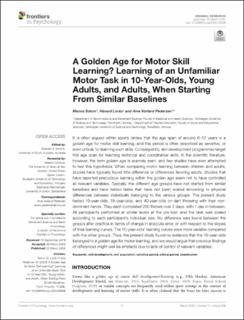| dc.contributor.author | Solum, Marius | |
| dc.contributor.author | Lorås, Håvard | |
| dc.contributor.author | Pedersen, Arve Vorland | |
| dc.date.accessioned | 2020-03-26T08:58:10Z | |
| dc.date.available | 2020-03-26T08:58:10Z | |
| dc.date.created | 2020-03-06T12:16:55Z | |
| dc.date.issued | 2020 | |
| dc.identifier.citation | Frontiers in Psychology. 2020, 11 1-8. | en_US |
| dc.identifier.issn | 1664-1078 | |
| dc.identifier.uri | https://hdl.handle.net/11250/2648764 | |
| dc.description.abstract | It is often argued within sports circles that the age span of around 6–12 years is a golden age for motor skill learning, and this period is often described as sensitive, or even critical, for learning such skills. Consequently, skill development programmes target this age span for teaching technical and coordinative skills. In the scientific literature, however, the term golden age is scarcely seen, and few studies have even attempted to test this hypothesis. When comparing motor learning between children and adults, studies have typically found little difference or differences favoring adults. Studies that have reported precocious learning within the golden age seem not to have controlled all relevant variables. Typically, the different age groups have not started from similar baselines and have tested tasks that have not been scaled according to physical differences between individuals belonging to the various groups. The present study tested 10-year-olds, 18-year-olds, and 40-year-olds on dart throwing with their non-dominant hands. They each completed 200 throws over 2 days, with 1 day in between. All participants performed at similar levels at the pre-test, and the task was scaled according to each participant’s individual size. No difference was found between the groups after practice in terms of change in absolute error, or with respect to the slopes of their learning curves. The 10-year-olds’ learning curves were more variable compared with the other groups. Thus, the present study found no evidence that the 10-year-olds belonged to a golden age for motor learning, and we would argue that previous findings of differences might well be artefacts due to lack of control of relevant variables. | en_US |
| dc.language.iso | eng | en_US |
| dc.publisher | Frontiers Media | en_US |
| dc.rights | Navngivelse 4.0 Internasjonal | * |
| dc.rights.uri | http://creativecommons.org/licenses/by/4.0/deed.no | * |
| dc.title | A golden age for motor skill learning? – Learning of an unfamiliar motor task in 10-year-olds, young adults, and adults, when starting from similar baselines | en_US |
| dc.type | Peer reviewed | en_US |
| dc.type | Journal article | en_US |
| dc.description.version | publishedVersion | en_US |
| dc.source.pagenumber | 1-8 | en_US |
| dc.source.volume | 11 | en_US |
| dc.source.journal | Frontiers in Psychology | en_US |
| dc.identifier.doi | https://doi.org/10.3389/fpsyg.2020.00538 | |
| dc.identifier.cristin | 1800122 | |
| dc.description.localcode | Copyright © 2020 Solum, Lorås and Pedersen. This is an open-access article distributed under the terms of the Creative Commons Attribution License (CC BY). The use, distribution or reproduction in other forums is permitted, provided the original author(s) and the copyright owner(s) are credited and that the original publication in this journal is cited, in accordance with accepted academic practice. No use, distribution or reproduction is permitted which does not comply with these terms. | en_US |
| cristin.ispublished | true | |
| cristin.fulltext | original | |
| cristin.qualitycode | 2 | |

